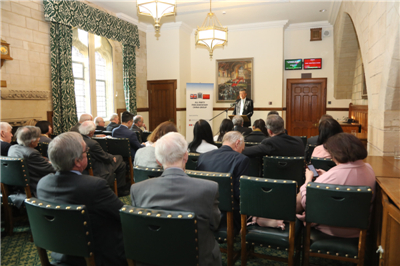Keynote Speech by H.E. Ambassador Liu Xiaoming at the APPCG Q&A with Ambassador on the 'Two Sessions': Understand the 'Two Sessions', Build up Consensus and Create a Bright Future


Third, China will make vigorous efforts to increase the level of opening up.
In 2018, China took the initiative to cut tariffs a number of times. As a result, average tariff was brought down from 9.8% to 7.5%.
The "Two Sessions" in March adopted the new Foreign Investment Law. This is of historic significance. The adoption of the new law means China's opening up is no longer limited to ensuring the free flow of production factors such as goods, capital and technology. It means that China will focus more on the systematic aspect of opening up, including
· stronger legal safeguards,
· better alignment with international practice and
· greater ease for doing business in China.
China's opening up will reach a higher level, and this will in turn promote higher-quality domestic development.
By adopting the new Foreign Investment Law to protect the legitimate rights and interests of foreign investment, China displays its resolve and confidence in deeper reform and greater market access for more foreign investment.
Last but not least: Where is China's foreign policy going?
Here in the UK, the recent topical issue regarding China is this:
· Is China's development a challenge or opportunity?
· Is China a partner or a competitor?
I think the answer lies in Xi Jinping Thought on Diplomacy. Understanding this Thought is the key to seeing the direction of China's foreign policy.
This year's "Two Sessions" reaffirmed that Xi Jinping Thought on Diplomacy offers the basic principles and guideline for China's foreign affairs in the new era.
Xi Jinping Thought on Diplomacy is profound and substantial. To understand this Thought, I think it is crucial to grasp the following three basic elements:
First, in the interest of the common good for all, China will work to build a community with a shared future for mankind.
This is not an empty slogan. It is a principle that guides the concrete actions of China's diplomacy.
At the end of last February, I attended a panel discussion in London hosted by the Concordia Africa Initiative, and had an in-depth exchange of views with the other panelists on international cooperation in Africa.
Debate shed light on truth. The panel discussion has strengthened my conviction that China-Africa cooperation is the best example of building a community with a shared future for mankind.
In its relations with Africa, China follows a "five-no" approach, namely,
· no interference in African countries' pursuit of development paths that fit their national conditions;
· no interference in African countries' internal affairs;
· no imposition of our will on African countries;
· no attachment of political strings to assistance to Africa;
· and no selfish political gain from the investment and financing cooperation with Africa.
Moreover, China-Africa cooperation has been aimed at meeting the needs of African countries, improving their capability of independent development and providing a better life to African people. Such cooperation is open to all countries in the world.
This fully reflects the values of building a community with a shared future for mankind.
This ideal is based on the pursuit of the common good for all. It meets the aspiration of people all over the world for a better future. It will gain the recognition of more and more countries and people.

































